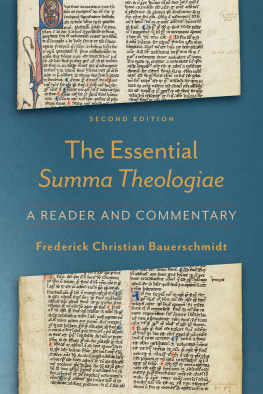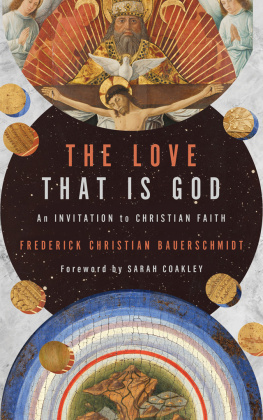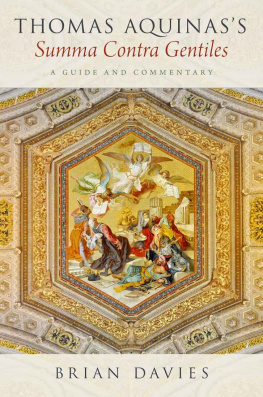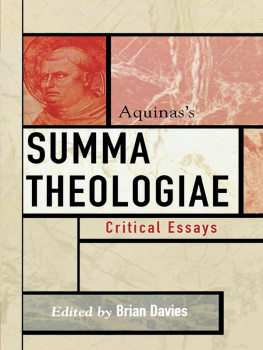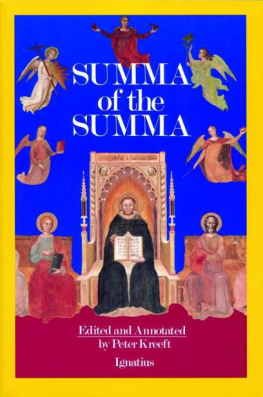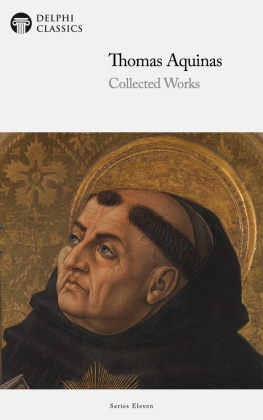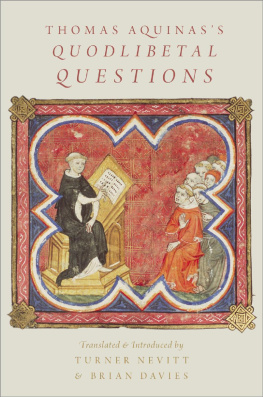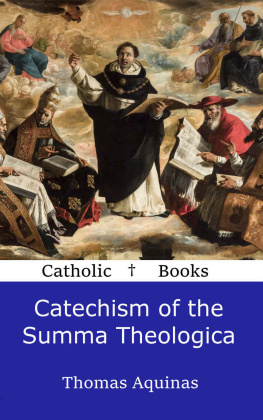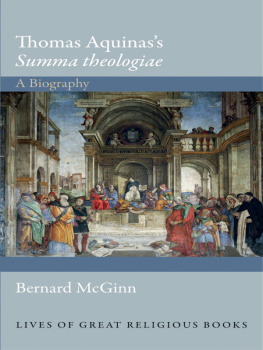Contents
Half Title Page
Title Page
Copyright Page
Dedication
Introduction
Prologue to the Summa theologiae
THE FIRST PART
Question 1: The Nature of Holy Teaching
1.1.1 Is any further teaching required besides philosophical studies?
1.1.2 Is holy teaching scientia ?
1.1.8 Does this teaching prove anything through argumentation?
1.1.10 Can one word in Holy Scripture have several senses?
Question 2: The Existence of God
1.2.1 Is the existence of God self-evident?
1.2.2 Can it be demonstrated that God exists?
1.2.3 Does God exist?
Question 3: The Simplicity of God
1.3.4 Are essence and existence the same in God?
Question 12: Knowledge of God
1.12.12 Can God be known in this life by natural reason?
1.12.13 Can a higher knowledge of God be attained by grace than by natural reason?
Question 13: Words for God
1.13.3 Can any word be applied to God in its literal sense?
1.13.5 Is what is said of God and of creatures said of them univocally?
Question 27: The Procession of the Divine Persons
1.27.1 Is there procession in God?
1.27.3 Does any procession exist in God besides that of the Word?
1.29.4 Does this word person signify relation?
Question 32: Knowledge of the Trinity
1.32.1 Can the Trinity of divine Persons be known by natural reason?
Question 36: The Person of the Holy Spirit
1.36.2 Does the Holy Spirit proceed from the Son?
Question 39: The Persons in Relation to the Essence
1.39.7 Are attributes of the essence appropriated to the Persons?
Question 43: The Sending of the Divine Persons
1.43.2 Is sending eternal or only within time?
Question 45: How Things Come Forth from the First Principle
1.45.5 Does it belong to God alone to create?
Question 50: The Substance of the Angels
1.50.1 Is there any entirely spiritual creature, completely nonbodily?
Question 75: The Nature of the Soul Itself
1.75.4 Is the soul the human being, or is the human being something composed of soul and body?
Question 93: The Image and Likeness of God
1.93.4 Is the image of God in each human being?
THE FIRST HALF OF THE SECOND PART
Prologue to the First Half of the Second Part
Question 1: The Final Goal for Human Beings
12.1.1 Do human beings act because of an end?
Question 3: What Happiness Is
12.3.8 Does perfect human happiness consist in the vision of the divine essence?
Question 4: Those Things That Are Required for Happiness
12.4.6 Is perfection of the body necessary for perfect human happiness?
Question 5: The Attainment of Happiness
12.5.4 Can perfect happiness be lost after it has been acquired?
Question 6: The Voluntary and Involuntary
12.6.1 Is anything voluntary found in human acts?
Question 9: The Mover of the Will
12.9.1 Is the will moved by the intellect?
12.18.4 Is a human action good or bad on account of its end?
Question 55: The Essence of the Virtues
12.55.4 Is virtue suitably defined?
Question 61: The Cardinal Virtues
12.61.2 Are there four cardinal virtues?
Question 62: The Theological Virtues
12.62.3 Is it fitting to posit faith, hope, and charity as theological virtues?
Question 65: The Connection of the Virtues
12.65.2 Can there be moral virtues without charity?
Question 68: The Gifts
12.68.1 Do the gifts [of the Holy Spirit] differ from the virtues?
Question 71: Vices and Sins Considered in Themselves
12.71.6 On the definition of sin proposed by Augustine.
Question 91: The Various Kinds of Law
12.91.2 Is there any natural law?
12.91.3 Is there any human law?
Question 109: The Necessity of Grace
12.109.2 Can human beings wish and do good without grace?
12.109.6 Can human beings, left alone and without the external aid of grace, prepare themselves for grace?
Question 110: The Grace of God as Regards Its Essence
12.110.1 Does grace posit something in the soul?
THE SECOND HALF OF THE SECOND PART
Prologue to the Second Half of the Second Part
Question 2: The Act of Faith
22.2.3 Is it necessary for salvation to believe anything above natural reason?
22.2.7 Is it necessary for salvation to believe explicitly in the mystery of Christ?
22.2.10 Does reason influencing us in matters of faith lessen faiths merit?
Question 11: Heresy
22.11.3 Should heretics be tolerated?
Question 17: Hope
22.17.2 Is eternal happiness the proper object of hope?
22.19.11 Does fear remain in the heavenly homeland?
Question 23: Charity
22.23.1 Is charity friendship?
Question 24: Charity in Relation to Its Subject
22.24.9 On the different degrees of charity.
Question 40: War
22.40.1 Is any kind of war licit?
Question 47: Prudence in Itself
22.47.4 Is prudence a virtue?
Question 58: Justice
22.58.1 What is justice?
Question 64: Homicide
22.64.7 Is it licit to kill someone in self-defense?
Question 77: Cheating That Is Committed in Buying and Selling
22.77.1 Is it licit to sell something for more than it is worth?
Question 123: Fortitude
22.123.3 Is fortitude about fear and daring?
Question 124: Martyrdom
22.124.2 Is martyrdom an act of fortitude?
Question 141: Moderation
22.141.4 Is moderation only about desires and delights of the sense of touch?
Question 153: Lust
22.153.2 Is there no sexual act that is without sin?
Question 182: The Active Life Compared to the Contemplative Life
22.182.1 Is the active or the contemplative life superior or more worthy?
THE THIRD PART
Prologue to the Third Part
Question 1: The Fittingness of the Incarnation
3.1.1 Was it fitting that God should become incarnate?
3.1.2 Was it necessary for the restoration of the human race that the Word of God should become incarnate?
3.1.3 If humanity had not sinned, would God have become incarnate?
3.2.2 Did the union of the incarnate Word take place in the person?
Question 9: Christs Knowledge in General
3.9.4 Did Christ have any knowledge acquired through experience?
Question 16: What Is Fittingly Said of Christ
3.16.1 Is this statement true: God is a human being?
Question 17: Christs Unity with Regard to His Existence

